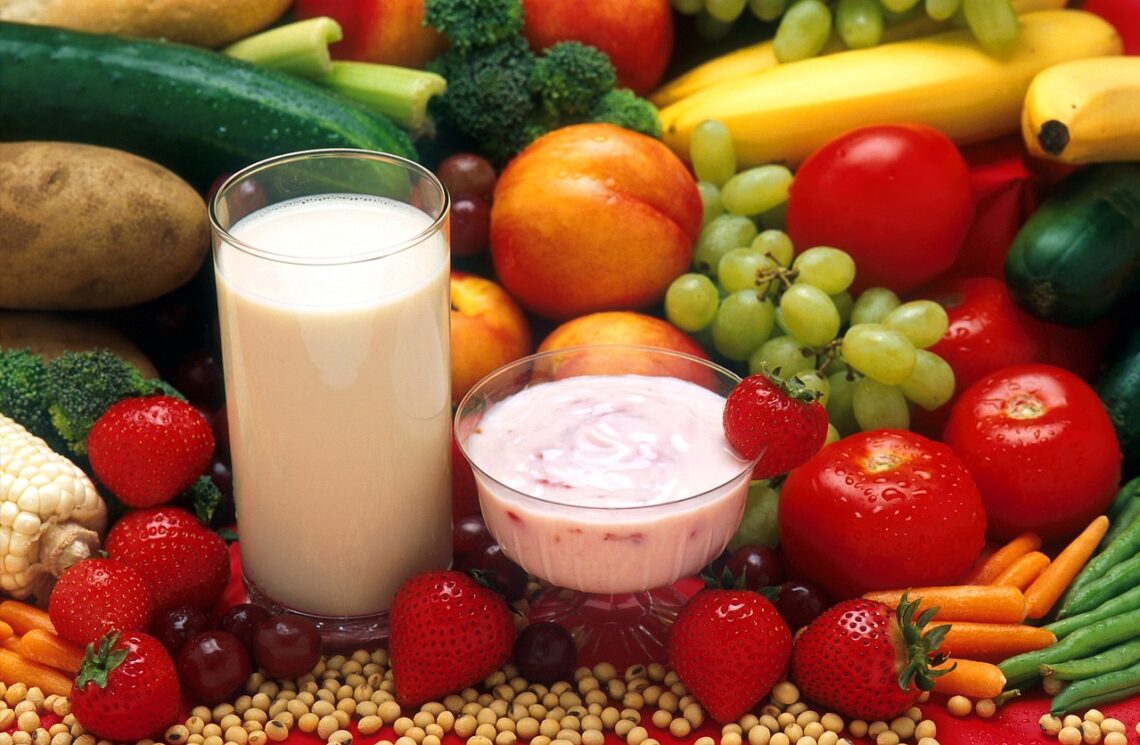
Easy Ways to Start Eating Healthier
“Healthy eating is a way of life, so it’s important to establish routines that are simple, realistically, and ultimately livable.”—Horace
Starting to eat healthier can be a positive and beneficial change for your overall well-being.
Does what you eat matter?
Absolutely!
Why?
Your health depends, in part, on what you eat.
But eating healthy does not have to be complicated.
Healthy eating can be as simple or elaborate as you make it.
In this article, I will share six ways to get you started: (1) Balance in food choices, (2) Moderation in the amount, (3) Nutrient density, (4) Minimally processed food, (5) Hydration, (6) Listen to your body.
I will finally offer critical points to food safety.
Let us begin.
Balance
Focus on consuming various whole foods from different food groups, including fruits, vegetables, whole grains, lean proteins, and healthy fats.
Eating “real” food helps ensure you get a wide range of nutrients.
Concentrate on eating whole, fresh foods that people have enjoyed for millenniums.
Avoid commercially prepackaged foods and fast-food chain restaurants.
Foods that contain high levels of sugar, salt, and fat are associated with heart disease, stroke, cancer, and other serious illnesses.
When cooking your food, try steaming, baking, and broiling instead of frying.
Try using more herbs and spices to cut down on salt.
And make sure you properly cook meats and never eat spoiled food.
Moderation
Do not overeat.
The statistics are not pretty:
“13% of adults in the world are obese. 39% of adults in the world are overweight. One-in-five children and adolescents, globally, are overweight.”
Source: ourworldindata.org
The World Health Organization reports a dangerous worldwide increase in overweight and obese people, often due to overeating.
What happens to your body when you overeat?
- The stomach expands to adjust to a large amount of food and pushes other organs, making you uncomfortable. This discomfort can lead to sluggishness and fatigue. And your clothes feel tight.
- Overeating requires your organs to work harder to break the food down.
- Consuming too much food may result in heartburn.
- Your stomach may also produce gas, leaving you with an uncomfortable feeling.
- Your metabolism may speed up, leaving you to experience feeling hot, sweaty, or dizzy.
Tips to stop overeating:
- Pay attention to portion size and eat sensibly, avoiding processed foods.
- Eat your fill of fresh fruits and vegetables.
- Use a smaller plate. Eat from a salad plate instead of a dinner plate.
- Avoid watching TV or using the computer and instead focus on your meal.
- Eat slowly.
- Plan meals ahead of time.
- Keep a food journal.
Another risk of overeating is your sleep cycle can get messed up.
When overeating makes it hard to fall asleep, then what?
Insomnia is not fun!
Check out this article on my blog about the health benefits of a good night’s sleep: https://goldenpenllc.com/improve-the-quality-of-your-life-sleep/
Moving on
Nutrients
Choose foods rich in nutrients and low in added sugars, unhealthy fats, and sodium.
Hippocrates, called the “father of medicine,” is reported to have said:
“Thy food shall be thy remedy.”
Better than food as a remedy is a portion of food for health maintenance!
One thing on which practically all nutritionists seem to agree is that overeating fat can increase your risk of high cholesterol levels and increases your risk of heart disease.
Sensible eating habits include getting sufficient vitamins and minerals (often called micronutrients because your body needs only tiny amounts of them).
Without micronutrients in your body, you could suffer from a vitamin deficiency, which can result in horrific diseases and medical conditions.
For example:
- Scurvy (sailors would succumb to this disease due to lack of vitamin C found in fresh fruits and vegetables).
- Blindness (people still become blind in some developing countries from vitamin A deficiency).
- Rickets (soft, weak bones that sometimes lead to skeletal deformities, such as bowed legs resulting from vitamin D deficiency).
Benefits of micronutrients include:
- Strong bones
- Prevention f congenital disabilities
- Healthy teeth.
(Source: A Family Caregiver’s Guide: 7 Secrets to Replace Negative Triggers with Positive Emotions—2019)
Nutrient-dense foods provide essential vitamins, minerals, and other beneficial compounds.
Processed Food Dangers
What are processed foods?
Processed foods are food products undergoing various manufacturing processes to alter their original form, taste, texture, or shelf life.
These processes often involve adding ingredients, such as preservatives, flavor enhancements, sweeteners, or stabilizers, and may also include cooking, canning, freezing, or dehydrating.
Processed foods can range from minimally processed items, such as bagged salads, frozen vegetables, or roasted nuts, to highly processed products like soft drinks, chips, candy, and ready-to-eat meals.
Processed foods are commonly found in supermarkets and convenience stores and are often packaged for shelf life and ease of consumption.
While some processing methods can improve food safety and preservation, many processed foods are typically high in added sugars, unhealthy fats, sodium, and artificial additives.
Processed foods often lack essential nutrients and dietary fiber, which are necessary for a balanced diet.
Regularly consuming heavily processed foods is linked to an increased risk of obesity, heart disease, type 2 diabetes, and other health issues.
What are processed foods?
- Breakfast cereal
- Cheese
- Tinned vegetables
- Bread
- Snacks, such as potato chips, pies, and pasties
- Meat products, such as bacon, sausage, ham, and salami
- Microwave meals or ready meals
- Cakes and biscuits
- Drinks, such as milk or soft drinks
What makes processed food less healthy are the ingredients such as salt, sugar, and fat, which make their flavor more appealing.
These processed foods can also be higher in calories.
(Source: Natural Health Service, www.nhs.uk)
It is important to note that not all processed foods are inherently unhealthy.
Some minimally processed foods, like frozen fruits and vegetables or whole-grain bread, can still be part of a healthy diet.
However, it’s generally recommended to prioritize whole, unprocessed, minimally processed foods, such as fresh fruits and vegetables, lean meats, whole grains, and legumes, for optimal nutrition and health.
Bottom line: moderation.
Hydration
Life’s Precious Liquid—Water
Up to three-quarters of our body weight is water.
For example, the brain is 75 to 85 percent water, and the muscles are 70 percent.
Among other things, water helps us to digest and absorb food, carrying nutrients to the cells.
It removes toxins and other waste, lubricates joints and the colon, and regulates body temperature.
Drink plenty of water throughout the day to stay hydrated.
Hydration is a crucial aspect of overall health and, as noted above, can support various bodily functions.
So how much water should we drink?
The amount of water an individual should drink can vary depending on several factors, including age, sex, level of physical activity, climate, and overall health status.
However, a commonly recommended guideline is the “8×8 rule,” which suggests drinking eight glasses of water daily, totaling about 64 ounces.
The rule is easy to remember but only suitable for some.
Dr. Howard Flaks, a bariatric (obesity) specialist, says:
“The minimum for a healthy person is eight to ten (eight-ounce glasses a day. You need more if you exercise or live in a hot climate. And overweight people should drink an extra glass for every 25 pounds they exceed their ideal weight.”
Can other beverages be taken instead of water?
While fruit and vegetable juices diluted with water are good, they are not calorie-free.
Also, liquids loaded with sugar and milk increase the body’s need for water, as water is needed to digest them.
And alcohol and caffeine-containing beverages like coffee and tea are diuretics, making it necessary to drink more water to replace excreted water.
Tips for Drinking More Water
- Start each day with water.
- Replace all drinks with water.
- Take regular water breaks.
- Carry a water bottle.
- Add in some favorite flavors.
- Sip, don’t gulp.
Other Benefits to Your Health
- Water helps relieve fatigue.
- Water energizes the muscles and builds muscle tone.
- Water keeps the skin looking good.
- Water is necessary for digestion and helps prevent constipation.
(Source: https://goldenpenllc.com/senior-women-the-seven-keys-to-optimal-health/)
In addition to these guidelines, paying attention to your body’s signals and adjusting your water intake is essential.
Physical activity, hot weather, and illness may require increased fluid intake.
On the other hand, certain medical conditions may necessitate limitations on fluid intake, as advised by your healthcare professional.
Ultimately, the best way to determine your ideal water intake is to consult a healthcare provider who can consider your specific health circumstances and provide personalized recommendations.
Bottom line, dear reader, there is no substitute for that precious liquid, water!
Listen to Your Body
Pay attention to your hunger and fullness cues.
Eat when you’re hungry, and stop eating when you’re full.
You are listening to your body while eating is an essential aspect of mindful eating, which can help you develop a healthier relationship with food and improve your overall well-being.
Here are some ideas to help you listen to your body while eating:
- Eat slowly: Take your time with each bite and savor the flavors and textures of the food. Eating slowly allows your body to register feelings of fullness, which can help prevent overeating.
- Pay attention: Focus on your meal and avoid distractions like TV, smartphones, or computers. Engage your senses and be fully present with your food.
- Start with small portions: Begin with smaller amounts and note how your body responds. You can always have more if you’re still hungry, but this approach allows you to gauge your body’s hunger levels.
- Pause while eating: Take breaks to assess your hunger and fullness. Ask yourself if you need more food if you have had enough.
- Identify hunger cues: Learn to differentiate between actual hunger and emotional or boredom-based eating. If you’re not hungry, find alternative ways to address those feelings.
- Stop when you’re satisfied: Avoid the tendency to overeat just because there’s food left on your plate. Listen to your body’s satiety signals and stop eating when you feel comfortably full.
- Eat mindfully: Be aware of how your body feels before, during, and after the meal. Notice any changes in energy levels, mood, or physical sensations.
- Stay hydrated: Sometimes, our body may mistake thirst for hunger. Ensure you’re drinking enough water throughout the day to stay adequately hydrated.
- Be kind to yourself: Don’t be too hard on yourself if you occasionally overeat or make less healthy choices. Mindful eating is a journey, and it’s okay to have occasional slip-ups. The key is to learn from them and move on.
By cultivating these mindful eating habits, you can better understand your body’s hunger and fullness signals, leading to a more balanced and enjoyable relationship with food.
Everyone’s body is unique, so finding what works for you is essential.
Bonus topic:
Four Tips for Food Safety
- Prepare food safely.
Why? Dangerous germs in contaminated food and water can enter your body and make you sick.
Health experts recommend:
Before you prepare food, wash your hands with soap and water. Rub your hands together for at least 20 seconds.
Wash cutting boards, dishes, and anything else that will touch food.
Wash all fruits and vegetables.
- Separate raw and cooked foods.
Why? Germs from raw food, such as meat and juices, will contaminate other food.
Health experts recommend:
Separate all raw foods—especially meats—from prepared foods when you carry them home from the market and store them.
After cutting raw meat, thoroughly wash your hands, the knife, and the cutting board before cutting any other food.
- Make sure the food that needs cooking is cooked thoroughly.
Why? Harmful germs die if the food reaches a high enough temperature.
Health experts recommend:
Cook food until it is sweltering. Food, including the innermost portions of meat, much reach 70 degrees Celsius (160 F) for at least 30 seconds.
Bring soups and stews to a boil.
To eat previously-cooked food, reheat it until it is hot and steaming.
- Keep food at a safe temperature.
Why? If you store food at a temperature between 5 and 60 degrees Celsius (40-140 F) for just 20 minutes, it can double the number of bacteria. Further, if raw meat is not stored at safe temperatures, some bacteria can produce toxins not destroyed by cooking.
Health experts recommend:
Keep food hot or cold, not lukewarm, to slow or stop germs from multiplying.
Never leave food sitting at room temperature for more than two hours or more than one hour if the room temperature is over 32 degrees Celsius (90 F)
After cooking, keep food hot until just before serving.
It is a common misconception that you can safely eat food if it looks, smells, and tastes fine.
Germs, or microorganisms, are living things so small that you cannot see them with your naked eye. They include bacteria, viruses, and parasites.
Some microorganisms are beneficial, but harmful ones can hurt or even KILL you.
Yes, it matters what you eat!
Follow these suggestions.
Your health depends on it!
Key Takeaways
- Balance in food choices is essential to maintaining good health and overall well-being.
- Moderation in eating habits will help you avoid overeating and maintain a healthy weight.
- Nutrient-dense foods provide essential vitamins, minerals, and other beneficial compounds for a healthy body.
- Limit processed foods as they lack the nutrients and dietary necessary for a healthy body.
- Water is invaluable and considered life’s precious liquid. Be sure to drink plenty of water throughout the day to remain hydrated.
- Listen to your body constantly. Practice mindful eating to help you develop a healthy relationship with food.
A Bonus Topic provided helpful tips for food safety.
Start today!
Adopt the Easy Ways to Start Eating Healthier presented in this article.
The benefits are numerous to your physical health but also contribute to mental well-being, longevity, and overall quality of life.
Eating Healthier is a positive and proactive step towards caring for yourself and enjoying a healthier and happier future.
Begin now!!




